How Are AI-Driven Solutions Enhancing the Growth in the Legal Profession?
In the world of evolving technology, every business gets in turmoil that how this new technology will disrupt their daily operations and the job of those who choose that profession.
And the legal profession is not excluded from this phenomenon. Today Artificial Intelligence (AI) is initiating the revolution in the legal industry too and in many ways, but in most cases, it enhances what humans execute and free them up from repetitive tasks. This has enabled professionals to take on higher-level functions such as advising to clients, appearing in courts, and negotiating in deals.
AI has become one of the hot topics but do you know what AI is? Let’s Discuss.
Artificial Intelligence impersonates certain operations like human’s mind, and this term is used when machines accomplish all the tasks that typically require human intelligence. The term machine learning mimics when computers use algorithms to analyze data and learn patterns and garner insights from data. AI has become a popular factor by changing the ways of legal work was done earlier.
The LegalTech market already encompasses a $16billion in the US and is expected to grow in the coming years.
Let’s take a look at the legal operations that are enhanced with the help of using AI applications:
1. Contract review and management:
Many law departments waste ample of their time reviewing and managing contracts before they’re signed. And according to researchers, the in-house legal professionals spend 50% of their time reviewing contracts that are basic like Non-disclosure agreement, creating redundant blockage and hampering the business deals.
But there are AI applications that make the contract review process seamless. With these tools, you will quickly get the answer to the question “Can I sign this contract?” and within one hour or less, reducing legal blockage and improving the turnaround time you can make the decision. AI, like humans, focuses on primary clauses and phrases that are necessary to review, reducing countless hours of lawyers. Some top companies like JP Morgan have created their own AI tool known as LawGeex, Legal Robot, and ThoughtRiver that quickly reviews the contract that a human will take 3,60,000 hours to achieve.
2. Legal Metrics and Analysis:
The AI-based legal metrics ease the litigation work for lawyers, not by presenting in courts for trails but giving an accurate prediction of the particular case. How? It has an intuitive litigation database for all the cases of the law firm. AI application thoroughly understands the case with the help of algorithms and let you know the probability of winning or losing the case along with time-duration of each case.
The data help in-house legal experts to prepare themselves as per the collected evidence and documents.
3. Legal Research:
In the legal industry, research work is the primary aspect to understand every case. Previously, lawyers use to spend ample time learning to conduct research process with accuracy. Therefore, AI is accelerating this process and making the lawyers stress-free from legal research. AI-based tools like IBM Watson, CaseText, ROSS Intelligence, etc., are outperforming in this area by answering the lawyers in plain English so that they can perform well in their trials and win the case.
4. Contract due diligence:
Lawyers have a crucial role to play while managing contracts, they need to ensure that each contract meets legal obligations and stay up-to-date with the ever-changing compliance rules globally. The quick you will analyze the contracts, the more its efficiency increases to crack the deal. So the new AI-based applications for contracts are saving 20% to 40% on routine tasks.
Many law firms are using AI due diligence engines that include some of the best corporations and service firms. It has the capability to manage and extract several data in multi-languages. This technology quickly renews contracts and notify about contracts that are about to expire. These tools are known as Kira Systems, LegalSifter, LitlQ, Seal, etc.
5. E-discovery:
Parties that are indulged in litigation are legally impelled to find and exchange all the documents that are essential for the case prior trial. According to various studies, eDiscovery of these documents account for 70% of the cost of any lawsuit. Thus, the focus of AI in this area is to reduce the complexity and volume of relevant documents and help clients to save maximum by providing them accurate reviewed documents, which are essential for the case. Tools like Brainspace, Relativity, Everlaw, Catalyst, etc., are easy to use for streamlining litigation documents and making it more efficient.
6. E-billing:
Despite understanding the importance of the very legal bill, lawyers usually manage their expenses manually, i.e., spreadsheets. But AI is stepping into this process and generating detailed information into costs, calculated sourcing and validation of legal service providers. Not only service providers are promising to track timings, but also AI tools are providing more in-depth analytics to lawyers so that they can look at each task that consumes more time. Smokeball is one of these tools that allow lawyers to know whether they are spending their time on substantive work or not.
7. Administrative legal support:
Administrative tasks in legal firms create havoc on their day-to-day operations as law office management process is quite challenging. Lawyers need to manage their expenses, respond to clients promptly, set up meetings, take follow-ups, and a lot more. Now accomplishing all these non-core activities has become easier for legal firms with the help of Cortana- Microsoft’s powerful digital assistant. Surprised? Well, law firms today are making use of AI chatbots to respond out-of-office emails, or chat with your clients with set-algorithms helping lawyers to serve their clients better.
Drive the Growth of your Legal Office by Learning AI tools:
Over the few years, it will be interesting to see the impact of AI on the legal profession. Although many law firms and legal professionals are scared that they will lose jobs with the advent of AI, it’s not actually true. The motive every technology is to ease the work for businesses, therefore, even AI is eliminating entire repetitive task in the legal sector and allowing lawyers to stay focused on high-level critical legal tasks that will help to drive the growth of their legal firm.
Related Posts
In almost all forms of modern business, marketing is an essential function.
As the world of eCommerce continues to evolve, businesses are constantly seeking ways to stand out in the digital landscape. According to a report by Statista, it is predicted that global online sales will reach an impressive mark of $6.5 billion by 2023.
In the era of high-speed internet, owning a server with a 10Gbps connection offers an unparalleled advantage in terms of data transfer speed, website performance, and user experience.
To make your business successful in the modern age, you need to excel at digital marketing and have a strategy that can allow you to beat out the competition.
In the ever-evolving landscape of digital marketing, link building remains a cornerstone of search engine optimization (SEO).
In today's age, establishing an online brand presence is crucial for success. With the vast reach and accessibility of the internet, launching your brand online can open up endless opportunities for growth and expansion.













Comments
comments powered by Disqus